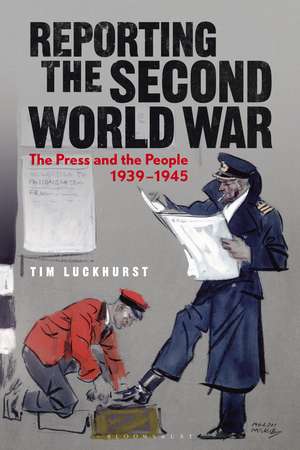Reporting the Second World War: The Press and the People 1939-1945
Autor Prof. Tim Luckhursten Limba Engleză Paperback – 8 feb 2023
| Toate formatele și edițiile | Preț | Express |
|---|---|---|
| Paperback (1) | 168.15 lei 3-5 săpt. | +45.62 lei 4-10 zile |
| Bloomsbury Publishing – 8 feb 2023 | 168.15 lei 3-5 săpt. | +45.62 lei 4-10 zile |
| Hardback (1) | 468.57 lei 6-8 săpt. | |
| Bloomsbury Publishing – 8 feb 2023 | 468.57 lei 6-8 săpt. |
Preț: 168.15 lei
Preț vechi: 193.83 lei
-13% Nou
Puncte Express: 252
Preț estimativ în valută:
32.18€ • 33.24$ • 26.78£
32.18€ • 33.24$ • 26.78£
Carte disponibilă
Livrare economică 04-18 martie
Livrare express 15-21 februarie pentru 55.61 lei
Preluare comenzi: 021 569.72.76
Specificații
ISBN-13: 9781350149489
ISBN-10: 1350149489
Pagini: 264
Ilustrații: 20 bw illus
Dimensiuni: 156 x 234 x 25 mm
Greutate: 0.45 kg
Editura: Bloomsbury Publishing
Colecția Bloomsbury Academic
Locul publicării:London, United Kingdom
ISBN-10: 1350149489
Pagini: 264
Ilustrații: 20 bw illus
Dimensiuni: 156 x 234 x 25 mm
Greutate: 0.45 kg
Editura: Bloomsbury Publishing
Colecția Bloomsbury Academic
Locul publicării:London, United Kingdom
Caracteristici
Uncovers forgotten controversies exposed in national newspapers, like Churchill's u-turn on the 'terror bombing' of German cities in light of RAF raids.
Notă biografică
Tim Luckhurst is Principal of South College and Associate Pro Vice Chancellor Engagement at Durham University, UK. He is also an award-winning journalist for BBC News and Current Affairs and former editor of The Scotsman, Scotland's national newspaper.
Cuprins
List of Illustrations 1. Introduction2. A Very Brief History of Newspapers3. The Press Barons, the Abdication of Edward VIII and the Era of Appeasement4. Newspapers in the Phoney War5. Churchill, Norway and Dunkirk6. Overseas Evacuation7. Battle of Britain8. The Blitz9. Morale, Intimidation and Censorship10. Britain and Russia: 'One Touch of Hitler Makes the Whole World Kin'11. Banishing Want from Cradle to Grave: A Symbol of a New Britain12. Peculiar Problems: Reporting the American Presence13. 'Bomb Back and Bomb Hard': Allied Bombing of Germany14. Auschwitz, Belsen and Buchenwald15. 'What a hair-trigger business the world has become':Victory in Europe, a General Election, Atomic Bombs and VJ DayConclusionBibliographyIndex
Recenzii
Tim Luckhurst's magisterial Reporting the Second World War: The Press and the People 1939-1945 does two things: It provides a scholarly, deeply-researched account of how British journalists reported the Second World War, and, in doing so, it shines a light on the practices of journalism. That a history book should succeed in doing both things is a mighty achievement.
Reporting the Second World War is a book which makes you feel good and proud to be a journalist and leaves you with the feeling that the history of journalism itself can be written with so much more optimism, truth and inspiration.
One of the very best journalism history books ever written. Outstanding research into the story of the Second World War through a critical, inspirational and brilliant study of the newspaper reporting by courageous British journalists still holding power to account while fighting to protect their country's democracy and freedoms.
Tim Luckhurst is that rare creature, a Professor of Journalism who actually believes in a free press. He charts with brilliant clarity how, after abdication and appeasement, it was the radical and irreverent tabloids, led by the Mirror, which reminded ordinary Britons that freedom means a press which serves its readers, not their rulers.
An engrossing critical history of journalism through one of the most profound periods of the 20th Century. Addressing contentious issues of the time, Tim Luckhurst provides original insight and compelling evidence into how our wartime newspapers shaped readers' opinions and challenged government.
Reporting the Second World War is a book which makes you feel good and proud to be a journalist and leaves you with the feeling that the history of journalism itself can be written with so much more optimism, truth and inspiration.
One of the very best journalism history books ever written. Outstanding research into the story of the Second World War through a critical, inspirational and brilliant study of the newspaper reporting by courageous British journalists still holding power to account while fighting to protect their country's democracy and freedoms.
Tim Luckhurst is that rare creature, a Professor of Journalism who actually believes in a free press. He charts with brilliant clarity how, after abdication and appeasement, it was the radical and irreverent tabloids, led by the Mirror, which reminded ordinary Britons that freedom means a press which serves its readers, not their rulers.
An engrossing critical history of journalism through one of the most profound periods of the 20th Century. Addressing contentious issues of the time, Tim Luckhurst provides original insight and compelling evidence into how our wartime newspapers shaped readers' opinions and challenged government.
